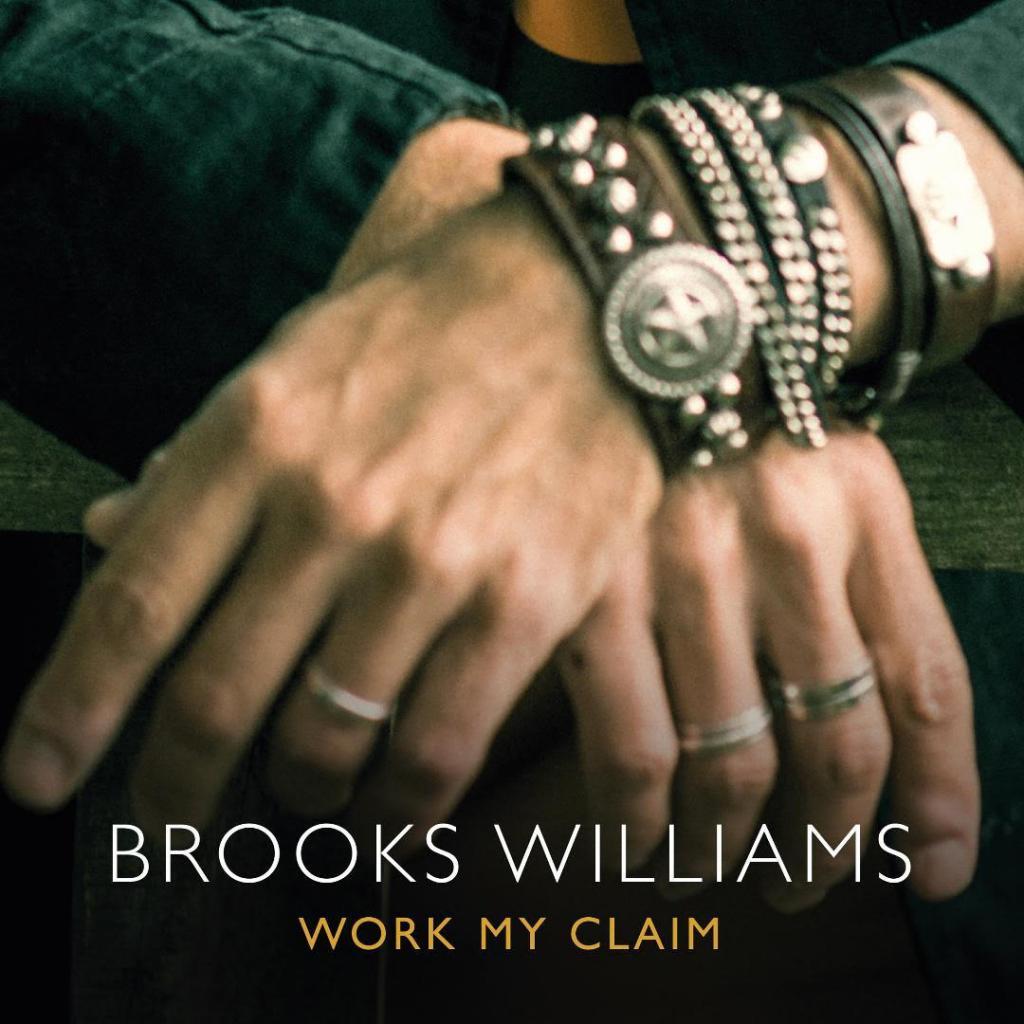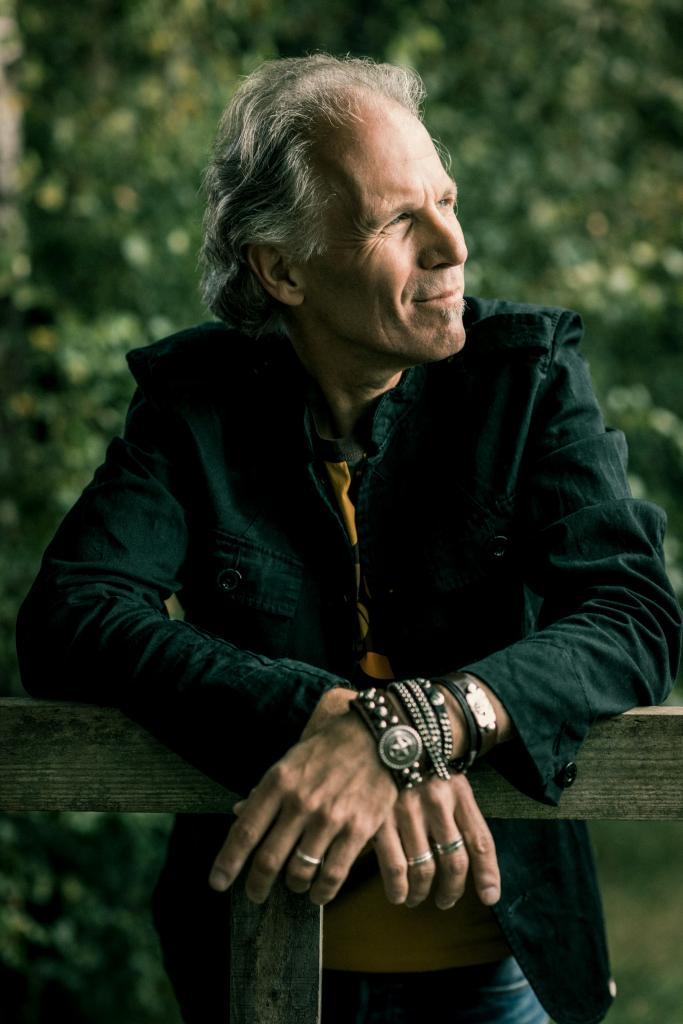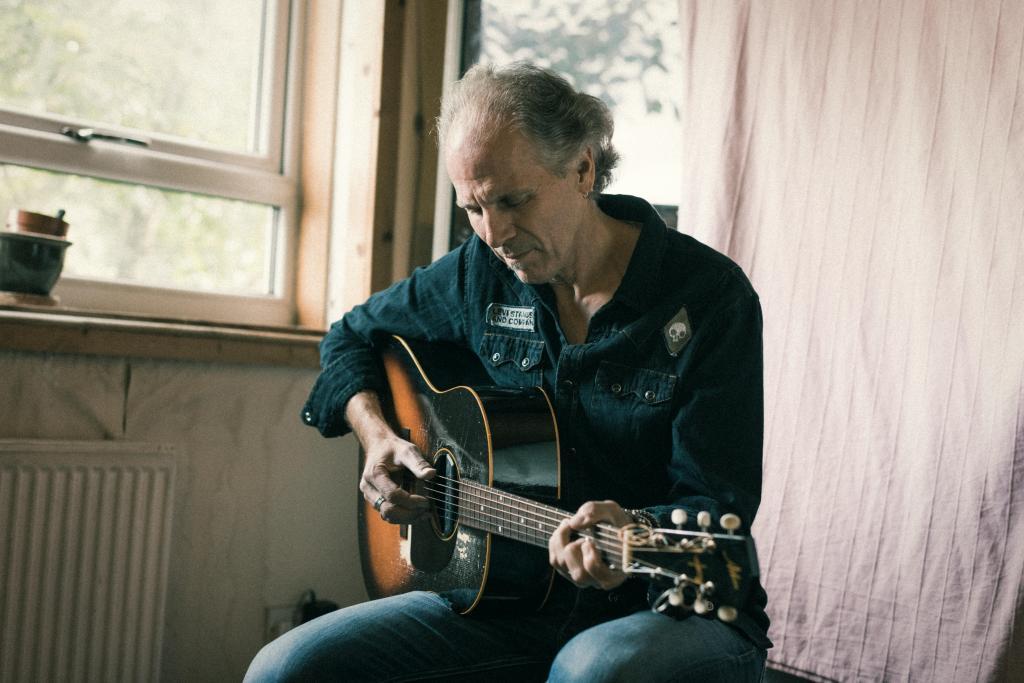Statesboro-born Americana, folk and country blues singer, songwriter and guitarist Brooks Williams celebrates 30 years as a musician with this 29th album, Work My Claim (Red Guitar Blue Music). Work My Claim, the latest album from Williams, is being released for his 30th anniversary tour. The itinerant bluesman shares his roots with fellow Georgian Blind Willie McTell. One of the hardest working troubadours in the business, Brooks is based in the UK but tours on both sides of the pond sharing his prodigious talent across two continents. Brooks has selected and re-recorded 12 tracks from his extensive repertoire and given them fresh interpretations with the help of a group of accomplished music making friends.

A bracing scene is set with “Inland Sailor,” the title of the 1994 album which kickstarted his career — one prophetic reviewer at the time predicting, “The buzz on Brooks Williams is about to become a roar.” The expressive, poetic lyrics of his original songs would in time become a trademark. Brooks paints a picture in words of the turning tides, the dramatic movement of the wind, the turbulent waves beneath his feet, the haunting cry of the gulls and the smell of the sea. The vibe is enhanced by the accompaniment of fiddle, mandolin and harmonium all reaching a crescendo alongside Brooks’ driving guitar rhythm and flowing vocals.
It was Dave Alvin who penned the timeless classic, “King Of California.” By the time Brooks recorded it in 2013 he was able to make it his own, this latest version taking the song to a new level with the ethereal backing of Jim Henry’s mandolin and the fiddles of Aaron Catlow and John McCusker, the latter also contributing harmonium and whistle. Williams has gained a considerable reputation as a consummate storyteller — none more so than on “Frank Delandry” the New Orleans guitarist who died under mysterious circumstances. The contrasting light and shade of Brooks’ voice and guitar maximizes the suspense of this engaging tale.
“Seven Sisters,” from the highly acclaimed 1997 album of the same name, is rich in the imagery of this small chain of mountains in the Pioneer Valley of Massachusetts and another master class in songwriting. Brooks was still establishing his blues credentials in 1995 when Knife Edge was released, featuring the old Doc Watson track “You Don’t Know My Mind,” with Ralf Grottian’s harmonica interludes adding style and authenticity. Williams proves he can write contemporary blues songs, such as “Here Comes The Blues.” He exhorts, “The world’s gone mad, it’s come unglued,” enhanced by the exquisite vocal harmonies of Christine Collister and Phil Richardson’s inspired piano contributions. Two other tracks from the most recent album, Lucky Star, are given makeovers: “Jump That Train” is a fine addition to the repertoire of memorable train songs in blues history thanks to Brooks’ brilliant slide guitar and powerful vocal duet with Collister. “Whatever It Takes” is transformed from a tear-jerking ballad on Lucky Star to a ragtime-infused, emphatic love song. Such is Williams’ skill in writing several different melodies to the same set.
On “Georgia,” Brooks is nostalgic for his hometown, “the Piedmont’s crowning jewel” reflected in the intricate finger picking style of the guitar playing, and mellifluously so. “Mercy Illinois” is the tale of a small town tragedy, the music less important than the true story. It is pure joy to watch Williams perform solo at a gig and to observe how he delivers the lyrics with such feeling and intensity whilst playing acoustic guitar with dexterity and desire — a scenario replicated on Duke Ellington’s “I Got It Bad (And It Ain’t Good).” This is front porch blues at its best. “My Turn Now” is a fitting finale with its clipped phrasing, rhythmic grooves and sumptuous slide. Is this going to be the year of victory for the TT motorcycle racer? “I’m tired of paying my dues, of being gracious when I lose.”
Brooks Williams has spent the past 30 years honing his craft and developing a sound which he has made unique by drawing upon and reworking the genres he has grown up with. Work My Claim is so much more than an album; it is a career-defining statement, an important legacy and a lifetime achievement.
The Brooks Williams Interview

David Scott for American Blues Scene:
Your latest, Work My Claim, is receiving the highest possible accolades and is clearly a very special piece of work which brings fresh interpretations to previously recorded songs. Can you tell us what the title means and the story behind how the album came about?
Brooks Williams:
The first step was to sort through songs from each of my 29 recordings. I spent about a year trying to determine which songs still felt relevant to me and which ones seemed to warrant a re-recording. The production decisions were easy: I wanted it to be acoustic, all based around the song itself. The title ‘Work My Claim’ comes from gold mining. One literally stakes an area (puts stakes in the ground) and claims (lets everyone know) they are going to work this patch ‘come hell or high-water,’ as the saying goes, as they will live off whatever proceeds they can dig from the ground. I sunk my stakes in the ground 30 years ago and announced to whoever was listening that I’m going to work my patch of the music world. I’ve been working that patch ever since. Was then. Am now.
I feel that the musicians on your latest album make a significant input, notably Aaron Catlow and Christine Collister; can you talk us through their individual key strengths and contributions to the overall sound?
In terms of the production sound of ‘Work My Claim,’ I knew I wanted to include fiddle and harmony vocals throughout. I met Aaron on tour in The Netherlands and was knocked-out by his playing. He was my first call and he is a delightful contributor. My second call was to Christine Collister. I’m a huge fan of her singing and am delighted to have her voice on the recording. My friend John McCusker surprised me by taking one of his two days off from the Mark Knopfler Tour to play on a few songs. Likewise, I was able to connect with my favorite pianist, Newcastle’s own Phil Richardson, as well as American mandolinist and good friend Jim Henry (we recorded an album called ‘Ring Some Changes’ twenty years ago), and a wonderful German harmonica player I met on tour called Ralf Grottian. All these sounds enhance and support the songs. They flow as natural as anything I’ve ever recorded.
Is there a song from your career that you are particularly proud of?
I’m especially proud of “Here Comes The Blues.” On ‘Work My Claim’ I’ve included the never-before recorded third verse. There’s also “Whatever It Takes,” which is recorded here as I first wrote it. “Inland Sailor” sounds like it was written yesterday. I’m also proud of “Gambling Man,” from ‘Lucky Star’.
Can you say a bit about yourself, how you became involved in music and your musical influences and experience?
My mum was a classical singer and ensured that there was always music around the house, but it was all classical music or Broadway musicals. I discovered rock and roll listening to late night radio and as I got older the rock and roll began to win out. Not giving up on her hope that I would play classical music, when I was ten years old, she enrolled me in a summer music programme to learn classical violin. It was a good way to keep a bored kid off the streets during summer holidays I think! Lucky for me, though, while I was at this summer camp I was befriended by a guy called Alan who worked in the kitchen. He was much older than us kids, probably all of 17, and he played the guitar. I was mesmerized by this and begged him to teach me something. He taught me how to play the chords to “Hey Jude” and the opening riff to “Purple Haze”. That was it. I was hooked! I begged my mother to buy me a guitar and, bless her, she took a chance and bought that guitar for me, a nylon-string little number like the kind Jose Feliciano played. Not exactly rock and roll, but it was a start.
My older brothers also influenced the music I listened to because they were so switched on to what was popular at the time, Beatles, Elvis, Chuck Berry, Beach Boys, Eric Clapton, Allman Brothers. They had a record player in their room and played their music at full volume. There was no way not to hear it! I just took it all onboard and got really excited about it all. Later I began to choose my own music, Hot Tuna (a bluesy spin-off of Jefferson Airplane), Bonnie Raitt, Taj Mahal, Ry Cooder, Mark Knopfler. About this time most of my peers started switching to the electric guitar but I really loved the acoustic guitar, by then I had a steel-string, and I found my way into the acoustic side of roots and blues music.
Having been born in Statesboro Georgia, were you aware as a youngster of Blind Willie McTell and his southern roots?
Funnily enough in my childhood no one really talked about the blues legends. We have the British Invasion to thank for that! Last year when I was on tour in the southern US states, Jo and I were amazed by the number of memorials there are to the old blues guys, like Lightning Hopkins and Blind Willie McTell. But when I was young no-one acknowledged these blues masters. It took people like Eric Clapton doing “Crossroad Blues” to teach me who Robert Johnson is. In fact, I thought the Allman Brothers had written “Statesboro Blues” because they are who I heard singing it. I didn’t even know the name Blind Willie McTell at that time! It was later that I figured out the connections between it all: that the music I enjoyed listening to and was trying to play was the music of the blues masters.
It was a long, slow road because no-one in my family played this music. I was really on my own in listening to blues/roots music. I did a lot of self-educating. I would go into record shops and I’d buy records blindly, based on what label released it, or whether it had a cool guitar pictured on the cover! So it was a slow process building up a repertoire of songs that influenced me. What changed my whole experience was when I moved to Boston when I was 17. Boston had an incredible live music scene, mainly coffee houses and tiny little clubs, and it is where I first saw solo roots performers. People like Chris Smither, John Hiatt, T-Bone Burnett, Rory Block, David Brombery and Taj Mahal. It was like a university degree course in solo acoustic roots performing and writing.
You are an excellent songwriter. Can you talk us through the process of writing a song and how lyrics and tunes come about?
Many blues artists cover songs from an existing repertoire but I prefer to find the inspiration to write my own material using the song structure of blues with a recognizable pattern of verse and chorus. It is important to have writers in the blues world so that these become the traditional songs of the future. I compare the process of writing instrumentals to film soundtracks because in my mind I am seeing scenes and I reflect on these visual images. For example, “Goodbye Walker Percy” is a tribute to the late Alabamian novelist and philosopher who lived in New Orleans so I had to create a feel for New Orleans so this piece feels like that city on a hot, humid day.
I look towards real life links but then I pull back from specifics and turn them into a universal idea. I then take the concept and then think about how it can be something others can relate to. Blues talks essentially about the human condition and how people relate to it. I cannot relate personally to picking cotton but I can relate to working hard for little reward as many people have jobs which don’t earn them much money.
Give us some idea of your life as a musician. How do you find life on the road, touring both sides of the pond and do you enjoy the touring life?
It is a fantastic life, to do what you love, and I am very lucky to be doing this work. It’s been 30 years and counting! There are also challenges to this life. The most obvious one being the travel involved and the number of nights I am away from home. I’ve been trying to get a handle on this in recent years, to balance the time I’m away and the time I’m home. This is important because when I first got married to Jo from Cambridge we tried to live on both sides of the Atlantic, but that was a logistical nightmare. So all things being equal with work and family, it made sense in our situation that I should move here to the UK although we also go back to America regularly for tours and to visit family.
Tell me about your guitar workshops and other musical education activities.
I run quite a few workshops in the UK and France as well as in the US. They traditionally focus on a specific aspect of guitar playing, like slide guitar or classic country blues chords. They are aimed at people who want to learn how to achieve a specific sound on their guitar but are a bit frustrated by the progress they make on their own. Even with all the stuff available on YouTube and the internet, small group tuition is often a better way to achieve this. The groups in my workshops, between 6 and 15 participants, are small enough so that everyone gets a lot of personal attention but big enough so that the players also get to enjoy playing together. I’ve learned most of what I know from other players and that is how this music lives. It gets passed on so I guess I’m carrying on that tradition with these workshops.
What advice would you give to aspiring guitarists?
My main advice to aspiring guitarists is that it is really important to understand the roots of what you are doing. You need to understand what came before and that paves the way towards innovation.
What are your plans and touring schedules for the rest of the year?
I’m touring pretty much the whole of 2020. I’m looking forward to our tour dates in the USA at the end of February/March and the UK in April-May. I’ll be doing some of the shows with Aaron Catlow and Phil Richardson. I’ll also be doing a few gigs with Rab Noakes. Boo Hewerdine and I will also do a handful of shows and record a new album for 2021. I’ll be back and forth from the UK to the USA a few times. Come December 2020 my wife and I are going on holiday!
Do you have a message for the American Blues Scene readers?
My experience with blues music is that it is a very powerful music style. It’s stronger than many people realize and is as relevant now as it was when W.C. Handy first heard the slide guitar on that darkened train platform way back when. Don’t sell it short or restrict it to one thing. It’s bigger than you can imagine. Open your mind and ears to the future possibilities. It’ll be here long after we’re dancing somewhere else.
Upcoming Gigs
Railroad Street Acoustic Cafe
Fri, Feb 28 Gulfport, MS USA
Calmes House Concert
Sat, Feb 29 Baton Rouge, LA USAGET TICKETS
Harmony House Concerts
Sun, Mar 1 Ravenna, TX USA
WUWF Radio Live
Thu, Mar 5 Pensacola, FL
Fiddle & Bow Society
Fri, Mar 6 Winston Salem, NC USA
Isis Music Hall
Sat, Mar 7 Asheville, NC USA
Odell Williamson Auditorium
Sun, Mar 8 Odell Williamson Auditorium , Bolivia, NC USA
Solo 30th Anniversary USA Tour – Part One!
The Cannery
Mon, Mar 9 Dataw Island, SC USA
Solo 30th Anniversary USA Tour – Part One!
Creek House Concerts
Fri, Mar 13 Creek House Concerts, St. Paul, MN USA
Solo 30th Anniversary USA Tour – Part One!
Chatfield Center for the Arts
Sat, Mar 14 Chatfield Center for the Arts, Chatfield, MN USA
The Folk Club
Tue, Mar 17 Reston, VA USA

